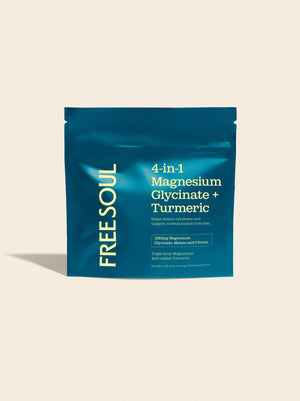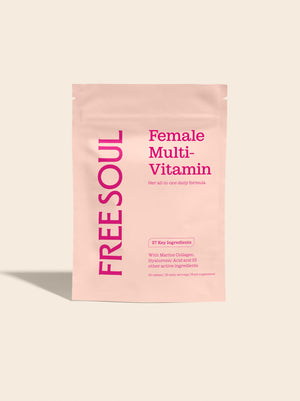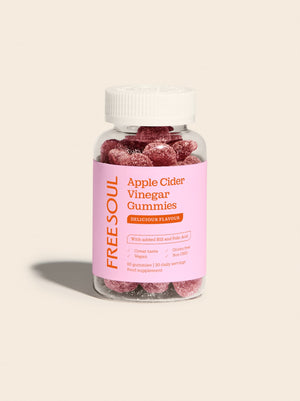If you’re struggling with hormone imbalances - heavy or painful periods, mood swings, weight gain, irregular periods, acne - you’re not alone. Nearly 90% of women in the UK struggle with PMS-type symptoms and a significant proportion of women are dealing with hormonal conditions like PCOS, Hypothalamic Amenorrhea and unexplained infertility.
So, how do we keep our hormones balanced to make sure we feel our best? We caught up with hormone specialist and lead nutritionist at FUTURE WOMAN, Francesca Lyon, to find out the best way to keep your hormones happy.
‘First of all, it’s important to say that symptoms like acne or irregular periods, pain with your period and unexplained mood changes are all common but not normal!’ says Francesca. So if you’re experiencing these symptoms it’s a good idea to seek out further support.
For more complex hormone conditions and for women that are extremely symptomatic, a more personalised approach works best.
But there are some important foundational changes that the team encourage all of their clients to make and that work for everyone.
‘The main one I often talk about is balancing blood sugar,’ Francesca says. ‘This has a HUGE impact on your hormones. And while it may sound like a really simple thing to do, we find it’s quite hard to pull off in modern life!’
What’s the link between blood sugar balance and your hormones?
Francesca explains that our blood sugar rises and falls throughout the day in response to what we eat, specifically how much sugar we eat. When we eat too much sugar or refined carbs, without balancing them out with fat, protein and fibre, then this causes our blood sugar to rise quickly and then fall just as quickly. This drop in blood sugar can kick off sugar cravings, fatigue, even irritability.
‘Anyone who’s eaten a massive bowl of pasta for lunch and then tried to do some work will know what I’m talking about!’ she jokes.
The problem is, every time our blood sugar levels rise, two other hormones rise too - insulin and cortisol. ‘I like to call these two hormones our Queen Hormones because they have a knock on effect on all our other reproductive hormones,’ she says.
What impact does Insulin have on hormones?
‘Insulin is a hormone produced in the pancreas in response to sugar in the bloodstream’ explains Francesca. It allows glucose to enter the cells so it can be used as energy.
Over time, as we eat more and more sugar or as we are exposed to stress, our insulin response can become desensitised leading to something called insulin resistance.
Insulin resistance is a leading driver of PCOS, and it basically causes an increase in testosterone, which in turn inhibits ovulation. Lack of ovulation = irregular periods and therefore low progesterone and imbalanced oestrogen. If you are looking for a supplement, try Free Soul's Myo-Inositol supplement.
And what about cortisol?
Cortisol is one of our main stress hormones that is released from the adrenal glands in response to a stressor. We are all familiar with the main causes of stress - work, relationships, financial troubles.
‘You may be surprised to learn that imbalanced blood sugar can also cause our cortisol levels to spike,’ Francesca explains.
High cortisol can repress and inhibit our reproductive hormones - it’s our body’s way of saying that it’s not a safe time to reproduce. The production of stress hormones like cortisol becomes a priority under stress in order to keep you alive and reproductive hormones like oestrogen are suppressed until the body is safe again and cortisol lowers.
What are some easy tips that women can start today to keep their blood sugar balanced?
Francesca’s first tip for balancing blood sugar is to have a high protein, low carb breakfast which will set you up for stable blood sugar throughout the day. A protein smoothie is a great option if you’re on the go - throw in some Free Soul Vegan Protein Blend, a handful of low sugar berries, and a tablespoon of nut butter. Eggs, breakfast sausages and chia seed puddings are also great options.
Her second tip is to eat three main meals a day with no snacks in between. It’s so common nowadays to see people grazing all day - but every time you eat, it causes your blood sugar to rise. By eating three proper meals a day full of good protein, fats and complex carbohydrates you soon will have enough energy to last between meals. If you do crave something sweet, have it after a meal as dessert instead.
Finally, taking a short 10 minute walk after every meal. Not only is this great for your blood sugar but also great for your mental health too. If you can’t get out of the office after lunch then Francesca recommends taking a walk around the room while you take a call to get that movement in! Walking encourages the body to move the glucose into the muscles and this way it can be used as energy.
Try these three changes, and you’ll quite quickly notice a change in your mood, energy and sleep. And then overtime, you’ll start to reap the benefits of healthy regular cycles, clear skin and a healthy weight.
Some other ways you can balance your hormones include:
Stay Hydrated
Drinking enough water and staying hydrated is crucial for hormone balance, as water is essential for hormone production and regulation, metabolism supports healthy digestion and it helps flush toxins from your body.
Drinking plenty of water and consuming water-rich foods can help support overall hormonal balance. For an extra dose of hydration try Free Soul Hydrate Electrolytes.
Manage Stress
Stress can wreak havoc on your hormones, so finding ways to manage it is key. This can include practices like meditation, yoga, or even just taking a few deep breaths when you feel overwhelmed.
Exercise is another great way to manage stress, as it releases endorphins that can boost your mood and help regulate your hormones. It’s important to note that exercise can also be a form of stress on the body, particularly if done in excess or in a way that is too intense.
It’s important to listen to your body and find a balance that works for you. Opting for lower-intensity exercise that doesn’t put extra stress on the body such as pilates, walking, swimming, strength training, and yoga can be beneficial.
Get Enough Sleep
Sleep is essential for hormone balance. Not getting enough sleep can disrupt your body's production and regulation of hormones like cortisol, growth hormone, melatonin, insulin, and leptin.
All are important in maintaining a healthy balance of hormones in the body. Aim for 7-8 hours of sleep each night, and try to establish a regular sleep schedule and good sleep hygiene to help regulate your body's natural rhythms and support quality sleep.








